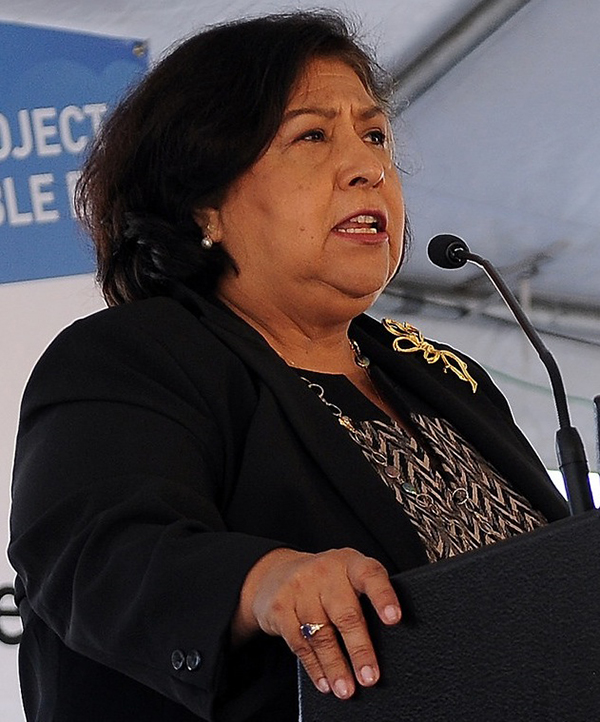Wave Staff and Wire Reports
LOS ANGELES — Black political leaders paid tribute this week to Latina political trailblazer Gloria Molina, who died May 14 after a three-year battle with cancer. She was 74.
Molina was the first Latina to serve in the state Assembly and on the Los Angeles City Council and the Los Angeles County Board of Supervisors.
“Gloria Molina was a force for unapologetic good and transformational change in Los Angeles,” Mayor Karen Bass said. As an organizer, a city councilwoman, a county supervisor and a state assemblywoman, Supervisor Molina advocated for those who did not have a voice in government through her pioneering environmental justice work, her role as a fiscal watchdog and her advocacy for public health.
“She shaped Los Angeles in a lasting way while paving the way for future generations of leaders. As the first woman mayor of Los Angeles, I know I stand on Supervisor Molina’s shoulders. On behalf of an ever grateful city, I express my deepest condolences to Supervisor Molina’s family, friends and community.”
U.S. Rep. Maxine Waters said her relationship with Molina dated back to 1976 when Waters was chief deputy to Los Angeles City Councilman David Cunningham Jr. and Molina was an aide to East Los Angeles Assemblyman Art Torres. Waters told the Los Angeles Times she leaned on Molina for support in her first campaign for the Assembly that year.
“We considered her the leader,” Waters said. “She was settled, she was cool. Without the men, she organized the women.”
City Councilman Marqueece Harris-Dawson called Molina a “voice of the people” who “left an indelible mark on our city through her unwavering commitment to public service.”
“She fought for social justice and championed policies that uplifted the people and families she served,” Harris-Dawson said. “Her contributions will continue to inspire generations, strengthening the foundation for progressive politics in L.A. I hope her work will serve as a guiding light for future change-makers.”
Harris-Dawson’s colleague on the council, Curren Price, also had high praise for Molina.
“Gloria Molina was in a league of her own,” he said, “accomplishing a lifetime of firsts that few could even dream of. … She diligently watched over her community with great compassion and fought with all her might to ensure her constituents had a fair chance at advancement.”
He said Molina “left behind an unparalleled legacy built on advocacy, equity and empowerment in the name of social justice.”
County Supervisor Holly Mitchell said she would Molina “by fighting to protect our children and each other every day.”
County Supervisor Janice Hahn issued a statement saying, “It takes an enormous amount of courage to be the first woman in the room and Gloria was the first woman and first Latina in nearly every room she was in across her career. She didn’t just make space for herself — she opened the door to the rest of us. “Women in politics, particularly in Los Angeles County, owe a great debt of gratitude to Gloria Molina.”
Prior to seeking elective officer herself, Molina served in the White House during the Carter administration and worked as a deputy for Assembly Speaker Willie Brown.
She first won elective office in 1982, winning the 56th Assembly District seat after bucking the Eastside Latino political establishment by defeating Richard Polanco, who would later become speaker of the Assembly. While in the Assembly, Molina led a fight to quash a proposed prison in East L.A.
Molina again went against the Eastside political machine in 1987 when she was elected to the City Council’s First District seat.
That time she ran against another former Torres aide, Los Angeles school board member Larry Gonzalez.
In 1991, she challenged Torres himself in the campaign for a newly drawn District 1 seat on the county Board of Supervisors. She won in the runoff, becoming the first woman elected to the board — once known as the “Five Little Kings” — though Yvonne Brathwaite Burke, who was appointed to fill a vacancy, was the first woman to actually serve on the board.
Known as a sharp fiscal watchdog, Molina served as a supervisor until 2014, forced out by term limits enacted in 2002. On her exit in 2014, she recalled her early years on the board, by saying, “Everything seemed like a battle.”
Molina, who grew up in Pico Rivera, was active in the early days of the Chicano movement, becoming an advocate for women’s health issues — which she continued into her elected offices. At one point, she founded a nurse mentoring program through local community colleges to address a nurse shortage.
After announcing she had cancer in March, the county Board of Supervisors renamed downtown’s Grand Park in honor of Molina. It’s now called Gloria Molina Grand Park.
The board of directors of the Metropolitan Transportation Authority also named an East Los Angeles rail station in her honor.
Funeral services were pending.
Molina is survived by her husband, Ron Martinez; daughter; Valentina Martinez; son-in-law, Brendan Curran; grandson, Santiago; as well as nine siblings: Gracie, Irma, Domingo, Bertha, Mario, Sergio, Danny, Olga and Lisa.
In lieu of flowers, Molina’s family requests that donations be made to Casa 0101 and LA Plaza de Cultura y Artes in her memory “to inspire and empower future generations through the arts.”










